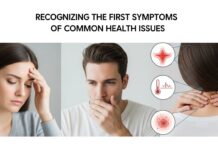Introduction
You might think that you’re doing the right thing by not smoking, as it’ll keep your heart safe. That’s true, but not the complete story. Even non-smokers can be threatened with hidden enemies. A heart disease that occurs in non-smokers, the signs are not visible sometimes until it gets serious.
Why does this matter? Because heart disease is still a major killer worldwide. According to the World Health Organization, cardiovascular diseases kill more than 17 million people every year. Many of the victims never saw it coming. If you’re aware of the signs in early stages, there is something you can do to prevent problems from becoming severe.
Managing daily challenges matters too. Tips for coping with type 2 diabetes fatigue and a routine to reduce arthritis knee flare-ups can improve comfort. Also, untreated atrial fibrillation can raise stroke risk, making timely care vital.
Why Heart Disease is Important for Non-Smokers
You may think risk is the territory of smokers only. But research shows that almost half of all heart attacks occur in non-smokers. Other triggers such as:
- Poor diet
- Stress
- Diabetes
- High blood pressure
- Family history
All raise your risk. That means that your lifestyle could be concealing warning signs.
Heart problems don’t always call attention to themselves with chest pain. In fact, in many of the early cases the signals are quiet and subtle. Identifying these changes could save your life.
Fatigue You Can’t Explain
One sign which is neglected is unusual tiredness. If you’re getting plenty of sleep but have no energy when you wake up, your heart may be in trouble.
Why does this happen? A weak heart just doesn’t pump as well. That restricts oxygen to your muscles and your brain. Even simple things such as walking to the kitchen may make you winded.
Fatigue is also linked to conditions such as the early manifestations of rheumatoid arthritis, in which inflammation can stress the heart. So if exhaustion lingers with no real cause, don’t shrug it off.
Swelling in Feet or Ankles
You might notice that your shoes are tight at the end of the day. While mild swelling can cause from sitting too long, persistent swelling may be a sign of heart failure.
Here’s why: a struggling heart fluid builds up. This swelling usually begins in the feet or ankles. Over time, it can continue to move upwards to the legs.
If you notice daily swelling, especially with breathlessness, your doctor needs to be consulted right away.
Shortness of Breath During Daily Lives
Another covert sign is the breathlessness. You may be winded just climbing stairs, carrying groceries, or even lying flat.
A normal heart pumps sufficient amounts of blood to keep oxygen flowing. But when the heart gets weaker, your lungs get full of fluid. That makes you gasping at rest.
This symptom is easily mistaken for asthma or getting older. But it may be, in reality, a harbinger of cardiovascular trouble yet to come.
Treatments may bring side effects. Be aware of neuropathy from prolonged chemotherapy and explore autoimmune pancreatitis treatment in children to support better care choices.
Dizziness and Lightheaded Spells
Do you feel dizzy if you stand up too quickly? That’s normal sometimes. But repetitive episodes of lightheadedness may indicate decreased blood flow.
A weak heart isn’t able to deliver stable circulation to the brain. The result is sudden dizziness, blurred vision or near fainting.
This symptom also comes with neurological problems such as the first symptoms of Parkinson’s disease but, if it happens along with chest discomfort or palpitations, it is heart disease more likely.
Jaw, Neck, or Back Pain
Chest pain is the one most know heart warning. But to non-smokers the discomfort often lurks in unlikely places.
Women especially, the pain is felt in the:
- Jaw
- Neck
- Upper back
- Shoulder blades
This pain may come and go. It may feel like a strain or tightness. But when it comes with feeling tired or feeling nauseated, don’t ignore it.
Interestingly enough, women have unique risks throughout other illnesses, too. For example, the earliest symptoms of thyroid cancer may also present in women as swelling or discomfort in the neck. This overlapping makes it even easier to miss cardiac pain.
Irregular Heartbeats
Your heart may occasionally skip a beat. This stress can be the cause from caffeine or inadequate sleep. But frequent irregular beats may indicate: Your heart’s electrical system is not normal.
You may feel like there’s fluttering or pounding inside of your chest. If combined with dizziness or shortness of breath it’s cause for concern.
Doctors refer to this as an arrhythmia. Left untreated it can have dangerous consequences such as stroke or sudden cardiac arrest.
Nausea and Indigestion
It’s common for you to blame stomach upsets on food. But sickness of the stomach, bloating, or indigestion may be silent signals from your heart.
During a heart attack, some, particularly women, experience digestive distress rather than pain in the chest. You may feel heavy stomach sensations or have unexplained nausea after eating light meals.
There is an overlap between this symptom and other conditions such as the early signs of pancreatic cancer as they also cause discomfort in the abdomen. That makes awareness that much more critical.

Sleep Disturbances
Poor sleep can be more than that stress. Studies show sleep apnea and insomnia may be risk factors for heart disease.
If you snore loudly, or wake up choking, or feel unrefreshed in the morning, there may be a problem with your heart overnight.
Interrupted sleep Oxygen level down. This causes the heart to weaken over time and raises blood pressure.
Brain Fog and Memory Trouble
Your heart and brain are closely connected. For example, poor circulation may involve lack of circulation to the brain causing confusion or memory lapses.
Many write this off as normal aging. But persistent unhealthy brain fog may well be an early clue. In fact, it resembles the initial signs of Alzheimer’s, in which memory weakening occurs progressively.
If you forget things, lose concentration or have trouble with simple planning, look at both the neurological and cardiac health.
Stress and Emotional Health
Stress is not just mental. Chronic stress impacts your blood pressure, sleep and hormone balance. These changes quietly work to stress your heart.
Your body is sending you signals of anxiety and irritability if you feel constant tension. Over time, your stress hormones, such as cortisol, can make your arteries harden. That cuts back on blood flow and increases the risk of heart disease.
Managing stress by meditation, breathing exercises or counseling can protect your heart as much as medication.
Staying healthy starts with awareness. Learn about lifestyle changes to prevent Alzheimer’s disease, the first symptoms of Parkinson’s disease, and the early signs of thyroid cancer in women to catch problems early.
Silent High Blood Pressure
High blood pressure is known as the “silent killer” for a reason. It rarely produces any early symptoms, but it wreaks havoc on the arteries on a daily basis.
You can feel fine, but have dangerous readings. That’s why it’s important that you see your physician regularly for checkups. A simple blood pressure measurement at home could show risks that are lurking beneath the skin surface.
Undiagnosed hypertension is frequently after complications. For people who don’t smoke, it’s one of the most common underlying causes of heart disease.
Cold Hands and Feet
Poor circulation may result in an unusually cold feeling in your hands and feet. While room temperature might have a role, chronically cold hands might indicate constricting arteries.
This condition, which is known as peripheral artery disease, is closely related to heart health. Not paying attention to it means more and more people are at risk for stroke and heart attack.
Not Classic Pain Is Just As Painful
Heart disease doesn’t always come in the form of a crushing chest pain. Sometimes that is demonstrated as forms of pressure, burning or a heavy sensation.
This may be mistaken for heartburn or muscular fatigue. But if it occurs during activity and subsides with rest, then this is a sign of caution.
Doctors call this angina. And even the milder cases need to be judged.
When Complicated by Other Diseases
“The other point is that cardiovascular trouble is so largely asymptomatic because it occurs alongside other conditions.” For example:
- The signs of multiple sclerosis include dizziness and fatigue, which are also the red flags for a heart problem.
- The initial symptoms of Parkinson’s disease can make you stiff and weak, which some may mistake for poor circulation.
- The early signs of rheumatoid arthritis are swelling and pain in the joints, sometimes affecting the heart also.
Most of the time, it overlaps, making it possible to confuse signs. That’s why it’s important to seek medical advice if symptoms fail to clear up.
Genetic Risk in Non-Smokers
And even with healthy lifestyle, family history seems to be tremendously influential. Your risk doubles if you have parents or siblings with early onset heart disease.
Genes impact cholesterol levels, blood pressure and structure of arteries. That means even non-smokers need to take note. Genetic screening can help to identify high-risk individuals at an early stage.

Subtle Skin Changes
Your heart problems show in your skin before you know it. Common signs include:
- cyanotic or bluish lips (low oxygen in the blood)
- Pale or clammy skin (lack of blood flow)
- Small yellow bumps around the eyes (mafous deposits of cholesterol)
These hints are small and are worth looking for. Although aesthetic, they can mean something more serious.
A Comparison of Insidious Prominences
Just quickly compare these subtle signs across conditions to be able to see the difference.
| 🩺 Condition | ⚠️ Subtle Early Sign | 🔍 Often Confused With |
|---|---|---|
| Heart Disease (Non-Smokers) | Fatigue, indigestion, swelling | Stress, aging, stomach issues |
| Multiple Sclerosis | Dizziness, muscle weakness | Low blood pressure, fatigue |
| Rheumatoid Arthritis | Joint stiffness, inflammation | Normal aging, overuse injury |
| Thyroid Cancer (Women) | Neck swelling, voice change | Throat infection, stress |
| Alzheimer’s | Memory gaps, brain fog | Normal forgetfulness |
This comparison illustrates why subtle symptoms often must not be neglected. Overlaps mix up patients, causing delay to diagnosis.
Easy Living Tips To Look Out For
In addition to physical symptoms, heart stress is obvious through minor changes in one’s lifestyle. Watch for:
- Having trouble with things you once did easily.
- Increased need to sleep following low-level activity.
- Developing increasing mood swings or irritability.
- Not doing the kind of physical activities that you used to do.
These changes are easy to ignore. But when mixed with other subtle symptoms they represent a distinct warning.
Prevention Begins With Awareness
Knowing the signs is step one. The next step is prevention.
Here are the habits you should do to safeguard your heart:
- Have your blood pressure checked often. Silent high blood pressure is dangerous.
- Eat a balanced diet. Eat whole grains, lean protein and healthy fats as eating basics.
- Stay active. At least 30 minutes of moderate exercise on most days.
- Manage stress. Yoga, breathing exercises, or journaling are some activities which can decrease cortisol.
- Get enough sleep. For that reason, sleep deprivation is a hidden risk for heart attack.
Professional Screening
Underestimation by non-smokers of their risk and failure to have screenings. But simple tests (e.g., cholesterol checks, ECGs, and blood pressure readings) may reveal hidden problems.
Heart imaging techniques such as an echocardiogram can also identify early heart disease before signs and symptoms.
The Role of Nutrition in Cardiovascular Disease
Still, what you eat is directly connected to your heart. A diet full of vegetables, fruits, whole grains and lean protein, has arteries clear. On the other hand, plaque silently gets built by processed foods, sugar, trans fats.
A lot of people who don’t smoke believe that their lifestyle can circumvent poor nutrition. Saturated fats – A diet rich in salt, and fried foods could increase blood pressure and cholesterol levels. Eventually, these silent changes add to heart disease.
One study published by the American Heart Association, reveals that a low sodium diet can reduce heart risk by almost 30%. One adjustment can keep problems away years from now.
Exercise: More Than Fitness
Regular exercise makes your heart muscle stronger. Even simply walking to put into circulation and reduce stress. It is not about doing extreme workouts, but about moving on a daily basis.
When you experience fatigue in your daily activity, it may not be laziness. It could be your heart telling you it is running less efficiently. Through walking carefully through activity, you allow your heart to adjust and gain strength.
The challenge is knowing your limits. If overexerted, dizziness or tightness within the chest can be a reaction. So, a slow and steady beginning is better.
Sleep and Recovery
Your heart requires a rest as much as do your muscles. Poor sleep increases cortisol, blood pressure and inflammation. Over a period of months or years, this causes heart function to weaken.
A lot of non-smokers don’t take sleep seriously as a risk factor. But research has shown even adults who only get six hours or less of sleep have higher rates of heart attack.
When you are noticing brain fog, mood swings or always feeling tired improve upon sleep might help take the strain off the heart.
Emotions and Heart Connection
Anxiety, depression and loneliness both impact heart health. Studies have demanded that social isolation does as much cardiovascular harm as smoking.
Non-smokers who neglect emotional health may be in harm’s way without knowing about it. If you’re feeling sad or stressed for a prolonged period of time, your heart may feel the effects. Counseling, mindfulness and community support transform into more than emotional care–they are heart care.
Technology In Early Detection
Modern tools have caught the heart disease earlier than before. Wearables measure things like pulse, rhythm and sleep patterns. Sudden changes often detect arrhythmias or problem with circulation.
For example, a smartwatch might alert you to such irregular beats before you ever start developing serious symptoms. These technologies aren’t a replacement for doctors but a great early warning system.
Pros and Cons of Screening
Screenings save lives, but they do raise questions, too. Here’s a balanced view:
| ✅ Pros | ⚠️ Cons |
|---|---|
| Detects hidden risks before symptoms grow | May create anxiety about results |
| Helps plan preventive lifestyle changes | Can involve costs if tests are advanced |
| Improves survival rates with early treatment | False positives may lead to unnecessary tests |
The benefits typically outweigh the risks, however, for those with family history or unexplained symptoms.
Practical Example: The Awareness of Case
Consider Sarah who is a 42-year teacher. She never smoked, houses reasonably well, kept herself active. Yet, she experienced a constant fatigue, which she explained as work stress.
A regular examination showed high blood pressure and early hardening of the arteries. The unpleasant signs when they were caught early, there were no serious problems with medication and lifestyle modifications.
This real life example illustrates why awareness is more important than assumptions.
Expert Insight
Cardiologists say early intervention saves lives. Dr. Heart specialist Karen Johnson of Johns Hopkins explains:
“Most patients with early heart disease don’t realise what is going on.” Subtle tiredness, swellings or indigestion may be pushed aside. “By the time chest pain comes on board, disease is often advanced.”
Her tips are helpful in strengthening the importance of paying attention to daily signals.

FAQs About Subtle Heart Disease in Non-Smokers
1. Can a heart disease strike even the non-smokers?
Yes. Non-smokers are still at risk for developing heart disease due to a variety of other factors such as genetics, high blood pressure, stress, poor diet or other medical conditions. Cigarette smoking is a risk factor that does not, however, mean complete protection.
2. What are the most common insidious symptoms?
Tiredness, breathlessness, swollen ankles, indigestion, and irregular heart beat are some of the earliest and simplest signs of heart ailments.
3. What are the distinctions of these symptoms from other conditions?
Many of the symptoms of heart disease are shared with other conditions like multiple sclerosis, rheumatoid arthritis or thyroid problems. Persistent or combined symptoms are more apt to be related to heart disease.
4. Is the nausea and indigestion a cause of concern?
Not always. However, fatigue and feeling sick to the stomach – if combined with sweating or chest discomfort – could be linked to heart problems. It’s best to consult a doctor.
5. How can I Reduce My Risk as a Non-Smoker?
Maintain a healthy diet, exercise, manage stress, get adequate sleep and visit the doctor regularly. All of these actions make you less likely to have heart disease that goes undetected.
Final Thoughts
Smokers are always aware, but for non-smoker it seems like a safe environment, however there are subtle signs that indicate otherwise. Research has shown that exhaustion, indigestion, swelling and changes in mood are all symptoms of concealed strain on the heart.
By mastering the ability to read these signs you can take charge of prevention. Emotional balance, lifestyle changes and timely screenings will keep your heart safe.
Keep in mind, the silent warning signs of heart disease in non-smokers don’t make noise. They mime words out in everyday life. Listening pays attention, and can mean years of health and vitality.









